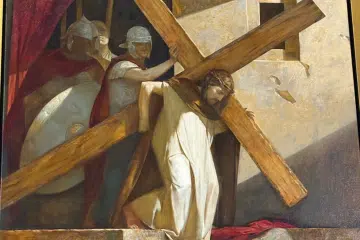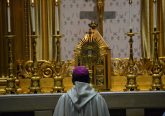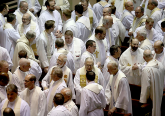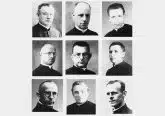Meet the laywoman who kept Catholic faith alive in Soviet camps
Vatican City, Oct 27, 2025 / 15:23 pm
A small delegation from Kazakhstan has brought to the Vatican two sealed boxes containing more than 30 pounds of documents, testimonies, and accounts of miracles for the cause of Servant of God Gertrude Detzel — a laywoman who kept the Catholic faith alive through decades of Soviet persecution. The materials, delivered to the Dicastery for the Causes of Saints on Oct. 21, mark the start of the Roman phase of the cause of the first laywoman from Central Asia to reach Rome.
“It was a very warm welcome,” said Auxiliary Bishop Yevgeny Zinkovskiy of Karaganda, Kazakhstan, who accompanied the dossier to Rome as notary of the diocesan process. “Amid so many causes, it was moving to see how our distant story from Kazakhstan was received with open arms. The universal Church has now welcomed Gertrude — we have placed her in its hands.”
Detzel, born in 1903 into a family of ethnic Germans in the Caucasus region of Russia, was deported to Kazakhstan during Stalin’s regime. She endured forced-labor camps — sent there because of her ethnicity — but would be imprisoned again later for another reason: her missionary zeal in spreading the faith.
“Even in prison, she couldn’t stop speaking about God,” said Bishop Joseph Werth, who was born in Karaganda and personally knew Detzel before serving as bishop in Novosibirsk, Russia. “When Stalin died and the time came to release prisoners, the guards reportedly said, ‘Let her go first — otherwise she will convert everyone here.’ That was the impression she left — she could not help but evangelize.”
After more than a decade of forced labor and imprisonment — including four years in Soviet prison for her faith — Detzel settled in Karaganda in 1956, drawn by its strong Catholic community. “She didn’t think about where she could live better,” said Bishop Adelio Dell’Oro, who oversaw the diocesan phase of her cause in Karaganda. “She thought about where she could serve — she wanted to be where there was a Catholic community.”
Even as a child, Detzel’s life revolved around faith. Werth recalled: “When she was little, Gertrude was sad that she’d been born a girl and couldn’t become a priest. The priest told her, ‘One day you will understand.’ And indeed — thanks to her, the flame of faith remained alive in the camps and later in Karaganda.”
As an adult, Detzel became a catechist and leader among the faithful — baptizing children, preparing them for the sacraments, and leading prayers when priests were absent. Each gathering carried risk; discovery could mean another arrest.
“She formed a whole generation of believers — not only laypeople but also priests and consecrated men and women,” Werth said. “I myself was taught the faith by her.”
For Dell’Oro, Detzel’s story carries a message beyond Kazakhstan.
“During the Soviet regime, people were forced to live as if God did not exist,” he said. “Today, no one forbids us to believe — yet we often live as if God does not matter. Gertrude reminds us that faith must again become the center of life — in persecution or in freedom alike.”
Interest in Detzel’s holiness first surfaced during the bishops of Central Asia’s “ad limina” visit to Rome in 2019, when Pope Francis urged them to preserve the memory of those who kept the faith alive “in silence and suffering.” Her cause was opened in Saratov, Russia, in January 2020 under Bishop Clemens Pickel and transferred to Karaganda in August 2021, 50 years after her death in 1971.

The diocesan inquiry concluded earlier this year after collecting testimonies from across Kazakhstan, Russia, and Germany.
Many witnesses were already advanced in age, making the gathering of reliable evidence a race against time. Even so, about 25 depositions were recorded — including those of Werth and several religious and laypeople who had known Detzel personally.
Dell’Oro said the research team even gained access to the presidential archive in Almaty, where they located and photographed Detzel’s personal case file, confirming the years of imprisonment she endured for her faith.
“Each document felt like a small resurrection of memory,” he said. “It was as if the truth about her life was finally allowed to speak.”
Though no religious communities existed in Kazakhstan at the time, Detzel lived her vocation as a consecrated laywoman. Before her deportation, she is believed to have made private vows, later joining the Franciscan Third Order under Servant of God Bishop Alexander Chira — the underground bishop who also suffered exile in Karaganda. When her remains were exhumed, a ring and wreath were found — signs of a hidden consecration and of a life offered entirely to God as a consecrated virgin.
According to Werth, Detzel led Sunday Liturgies of the Word when priests were absent — proclaiming Scripture, offering brief reflections, and preparing children and adults for the sacraments. When priests could pass through secretly, Dell’Oro noted, they entrusted her with the Eucharist to bring to the faithful who could not be reached openly.
Her home became a refuge for believers — a place of prayer and catechesis. Only as a laywoman could she have entered homes and sustained families in faith when priests could not.
“She didn’t try to replace priests,” Dell’Oro said. “But when they were absent, she did what was needed.”
“Gertrude formed consciences,” Werth added. “She taught us that holiness begins with fidelity in small things — and from that, everything else flows.”

The spiritual fruit of Detzel’s witness continues to grow in the Church — among priests, religious, and laypeople whose vocations were shaped by her example.
On Dec. 22, 1989, the Supreme Court of the Kazakh SSR officially rehabilitated her, acknowledging that she had committed no crime. Not long after, the Soviet system that had tried to silence the faith collapsed, and Kazakhstan declared its sovereignty on Oct. 25, 1990 — a moment now marked each year as Republic Day. This year marks 35 years since that declaration.
Her cause is now in Rome under the postulation of Father Zdzisław Kijas, OFM Conv, who has guided major causes, including those of Cardinal Stefan Wyszyński and the Ulma family.













